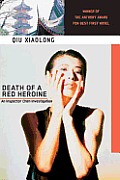 Once again, I owe Dan for his referral to the work of a writer I knew not at all–Qiu Xialong. Death of A Red Heroine is set in Shanghai in “the 90’s” and is much more than your garden variety detective novel.
Once again, I owe Dan for his referral to the work of a writer I knew not at all–Qiu Xialong. Death of A Red Heroine is set in Shanghai in “the 90’s” and is much more than your garden variety detective novel.
Yes, there’s a murder to solve, and young detective chief inspector Chen must defeat numerous and formidable obstacles to do so. However, Chen is a poet–published and gaining in popularity–as well as a cop, and conflicted about the multitudinous aspects of his character and talents that his job and his avocation require.

Time is a bird. It perches. It flies, he writes. And that sentiment pervades the novel as Chen’s investigation is blocked not only by the suspect trying to cover his tracks, but by Communist Party Forces–mostly represented by a cadre of party elders trying to hold back the younger generation’s wave of western ideas that Chen represents. They feel that solving the case might be an embarrassment to the party and therefore detrimental to the nation. Qiu comments often on how often these political/cultural forces have changed direction in the past century. Ideas that were fashionable and encouraged one day became reasons to be jailed or executed the next. We meet a number of people during Chen’s investigation whose lives were ruined before or during the cultural revolution for their writing. (cf. my commentary on Gail Tsukiyama’s 100 Flowers about a young man’s search for his father, jailed for signing a petition) Is Chen’s career such a bird? His romances? His friendships?
The zither, for no reason , has half of its strings broken,
One string, one peg, evoking the memory of the youthful years.
That’s a couplet, Chen tells us, from a Tang Dynasty (618-907) poet. He’s fond of quoting classic poets, and the lines are a commentary, perhaps on what’ s happened to so many who fell trying to maintain their balance trying to follow the ideological stepping stones the government laid in their way. And he doesn’t stop at poetry from his own culture. He did a college thesis on T.S. Eliot, and he runs into a college professor who sprinkles her conversation with Yeats. And all of this not only adds texture and perspective to this compelling story, but helps move the action as well because the direction of Chen’s investigation is often influenced both by the poetry and by his societal position as a poet. (The only other poet-cops I know of are Bart Schneider’s Sabbatini and Boyer. Enjoyable for sure, but I have to say, Qiu’s got them beat.)
For all the poetry, however, this is a murder mystery. A young woman has been strangled and her naked body shoved into a garbage bag and dumped into a canal. It turns out she was something called a National Model Worker, someone held up as a prototype for young people to follow because of her exemplary work as an employee at a department store. Thus, the case assumes importance beyond that of the regular homicide. And it assumes even more importance when it appears that the main suspect is the son of a Communist Party Legend. At that point, powerful forces step in to derail the investigation because, after all, this is recently after tiananmen square, and the party doesn’t want the further international embarrassment that the murder of a Model Worker by the the son of a Party Institution might generate.
Thus, Chen must deal not only with his own investigation, but with an investigation of his investigation and his personal life by secret police. He’s already ideologically suspect for this western ideas and poetry, and his supposed affair with the wife of a defector invites more suspicion. It all adds up to offenses that might not mean jail time but could certainly jeopardize his career and other prospects for the future.
We western readers get all this and multiple insights into what it was (and, I suspect still is) like to live in a quickly-changing semi-totalitarian country. Housing, food, clothes, transportation, all enter into the picture in surprising ways, and Qiu is masterful at weaving them into the action, not just tacking them on for atmosphere. Furthermore, if you’ve ever been to Shanghai (We spend a couple of days there a few years back.) The Death of A Red Heroine is a chance to relive some of the sights and sounds and smells as Chen makes his way around the city following clues. Edification and Delight were Dr. Johnson’s two criteria for high-quality literature, Qiu has delivered a boatload of both.
